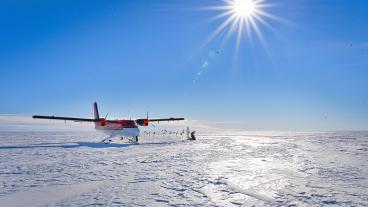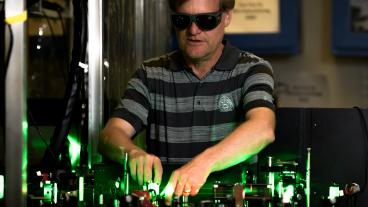Undergraduates in the Department of Chemical and Biological Engineering are taking part in the American Institute of Chemical Engineers' Chem-E-Car Competition, building a car that uses chemical energy both to power the car – safely carrying a load over a certain distance – and stop it.
The group, led by Alokya Perera and advised by Assistant Professor Kevin Cash, will compete at AIChE's Rocky Mountain Student Regional Conference, which takes place April 1 to 3 at the University of Arizona in Tucson.
Bryan Weaver is leading the development of the power mechanism, which uses a homemade battery of zinc and copper. "It has required quite a big review of basic electrochemistry and circuits for all of us," Perera said.
The team considered using a reaction that produces alcohol, and having the car stop when an attached breathalyzer-like device reached a certain measurement, but eventually deemed it unfeasible. They also looked at using a crystal violet decomposition reaction that would stop the car based on color, using a photogate, but issues with breadboards and circuits arose.
The stopping mechanism is unique – it uses Alka-Seltzer tablets dissolving in water to build up pressure in an Erlenmeyer flask. That pressure goes into a pump that extends a handle as pressure increases; that handle eventually hits a switch that turns the car off. Matt Rehberg is leading this part of the build.
"We tried producing a working fluid that would turn a turbine," Perera said, "but this became too complicated very quickly."
One challenge the team faced was working with mechanics and electricity. As Chemical Engineering majors, they have basic knowledge in these fields, "but for many of us, that was a few years ago and we have not had much practical application of those concepts since," Perera said. Help from other students and faculty have proven valuable in this regard.
Safety – led on the Mines team by Grant Sheridan – is a priority in the competition. The team had to write a comprehensive engineering design package. "It was a good introduction to basic chemical process safety for all of us," Perera said.
The team has been approved to compete pending more information on their power mechanism and a final review at the competition.
Contact:
Mark Ramirez, Information Specialist, College of Applied Science & Engineering | 303-384-2622 | ramirez@mines.edu
Karen Gilbert, Director of Public Relations, Colorado School of Mines | 303-273-3541 | kgilbert@mines.edu



